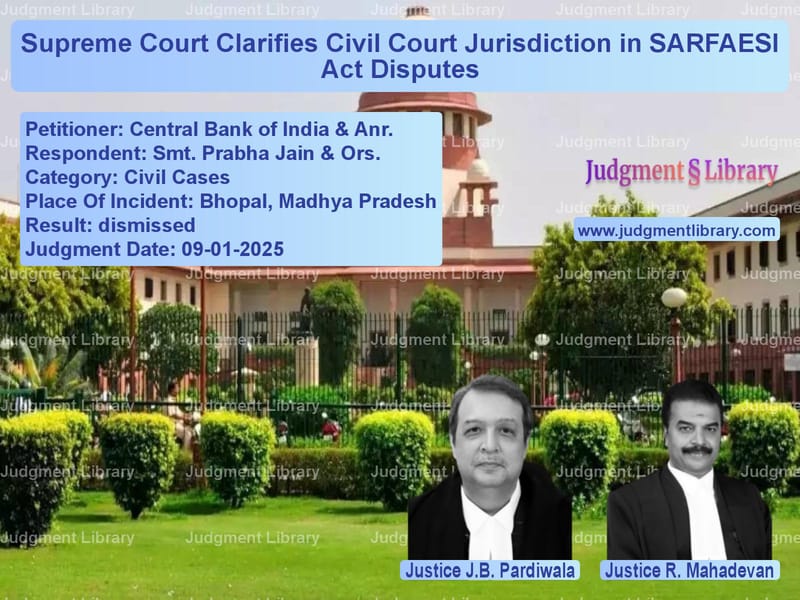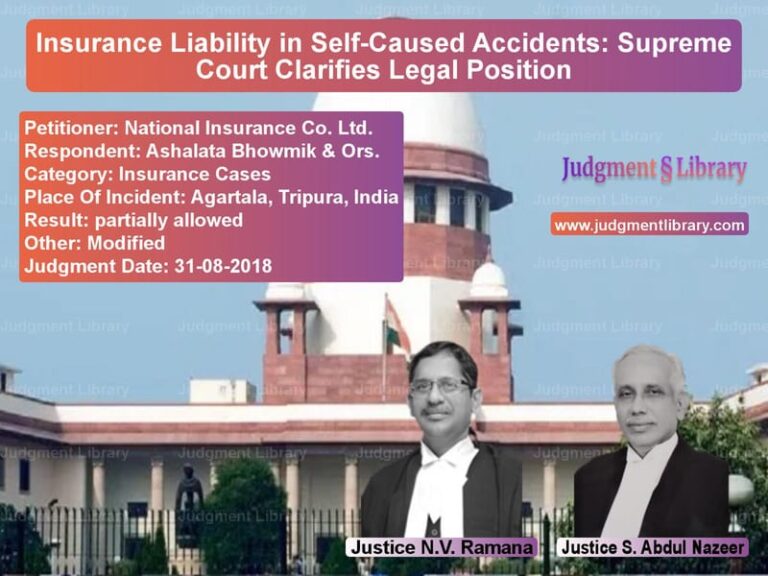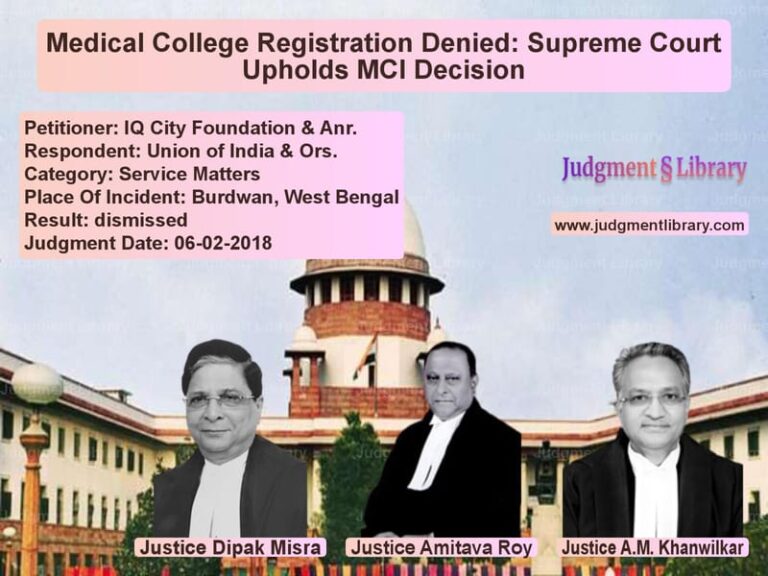Supreme Court Clarifies Civil Court Jurisdiction in SARFAESI Act Disputes
The Supreme Court of India, in a landmark judgment in Central Bank of India & Anr. vs. Smt. Prabha Jain & Ors., provided clarity on the extent of civil court jurisdiction in disputes arising under the Securitisation and Reconstruction of Financial Assets and Enforcement of Security Interest Act, 2002 (SARFAESI Act). The Court ruled that while the jurisdiction of civil courts is barred in matters falling exclusively under the Debts Recovery Tribunal (DRT), issues related to property ownership, fraudulent transactions, and sale deed validity remain within the domain of civil courts.
Background of the Case
The dispute arose when the respondents challenged a mortgage executed in favor of the Central Bank of India. The respondents claimed that the property in question had been fraudulently transferred before the mortgage, and thus the mortgage itself was invalid. The petitioners, the Central Bank of India, contended that under Section 34 of the SARFAESI Act, the jurisdiction of civil courts was barred, as the matter fell within the exclusive jurisdiction of the Debts Recovery Tribunal (DRT).
Key Facts
- The respondents challenged a mortgage executed in favor of the petitioner bank.
- They claimed that the sale deed preceding the mortgage was fraudulent.
- The petitioner bank argued that all disputes should be adjudicated by the Debts Recovery Tribunal under the SARFAESI Act.
- The High Court ruled in favor of the respondents, affirming civil court jurisdiction.
- The petitioner bank then approached the Supreme Court.
Legal Issues
Petitioner’s Arguments
The Central Bank of India argued that:
- The SARFAESI Act provides a complete framework for the enforcement of security interests.
- Under Section 34 of the SARFAESI Act, the jurisdiction of civil courts is explicitly barred in matters covered by the DRT.
- Allowing civil courts to intervene would defeat the purpose of the SARFAESI Act, which aims to ensure speedy recovery of secured debts.
Respondent’s Arguments
The respondents contended that:
- The dispute was not merely about the enforcement of a mortgage but about the validity of the sale deed preceding it.
- The sale deed was allegedly executed through fraud and misrepresentation, which required civil court adjudication.
- The jurisdiction of civil courts cannot be ousted in cases where ownership and title of the property are in question.
Supreme Court’s Observations
1. The Role of Civil Courts in Property Disputes
The Court reiterated that the jurisdiction of civil courts remains intact when the matter involves ownership and title disputes.
- “The jurisdiction of the Debts Recovery Tribunal is limited to resolving disputes regarding the enforcement of security interests.”
- “A civil court retains jurisdiction when the question of ownership or prior fraudulent transactions is raised.”
2. Interpretation of Section 34 of the SARFAESI Act
The Supreme Court clarified that Section 34 does not bar civil court jurisdiction in all cases involving secured assets.
- “Section 34 bars civil court jurisdiction only in cases where the DRT has explicit adjudicatory power.”
- “When the validity of the underlying sale deed itself is in dispute, the civil court is the appropriate forum.”
3. Protection Against Fraudulent Transactions
The Court emphasized that allegations of fraud require a full-fledged trial, which civil courts are best equipped to conduct.
- “A tribunal cannot decide questions of fraud, which require detailed evidence and cross-examination.”
- “The civil court must ensure that fraudulent property transactions are not used to validate security interests.”
Key Precedents Cited
- Mardia Chemicals Ltd. v. Union of India: Upheld the constitutional validity of the SARFAESI Act but clarified that borrowers have certain legal protections.
- Jagdish Singh v. Heeralal: Held that civil court jurisdiction is barred in cases of debt recovery under the SARFAESI Act.
- K.K. Modi v. K.N. Modi: Discussed the principles of jurisdiction in matters involving contractual and statutory disputes.
Final Judgment
- The Supreme Court dismissed the appeal filed by the Central Bank of India.
- The ruling of the High Court, which affirmed civil court jurisdiction in the matter, was upheld.
- The Court reiterated that matters involving title disputes and fraud are beyond the scope of the Debts Recovery Tribunal.
Implications of the Judgment
This ruling has far-reaching implications:
- Clarifies that the jurisdiction of civil courts is not entirely ousted under the SARFAESI Act.
- Ensures that fraudulent transactions are thoroughly examined before allowing banks to enforce security interests.
- Provides relief to borrowers who may have valid claims regarding ownership disputes.
- Maintains the delicate balance between creditors’ rights and individuals’ property rights.
The judgment reinforces the principle that the SARFAESI Act does not override all civil law protections, ensuring a fair adjudication process for property disputes.
Petitioner Name: Central Bank of India & Anr..
Respondent Name: Smt. Prabha Jain & Ors..
Judgment By: Justice J.B. Pardiwala, Justice R. Mahadevan.
Place Of Incident: Bhopal, Madhya Pradesh.
Judgment Date: 09-01-2025.
Don’t miss out on the full details! Download the complete judgment in PDF format below and gain valuable insights instantly!
Download Judgment: central-bank-of-indi-vs-smt.-prabha-jain-&-o-supreme-court-of-india-judgment-dated-09-01-2025.pdf
Directly Download Judgment: Directly download this Judgment
See all petitions in Property Disputes
See all petitions in Debt Recovery
See all petitions in Damages and Compensation
See all petitions in Judgment by J.B. Pardiwala
See all petitions in Judgment by R. Mahadevan
See all petitions in dismissed
See all petitions in supreme court of India judgments January 2025
See all petitions in 2025 judgments
See all posts in Civil Cases Category
See all allowed petitions in Civil Cases Category
See all Dismissed petitions in Civil Cases Category
See all partially allowed petitions in Civil Cases Category







